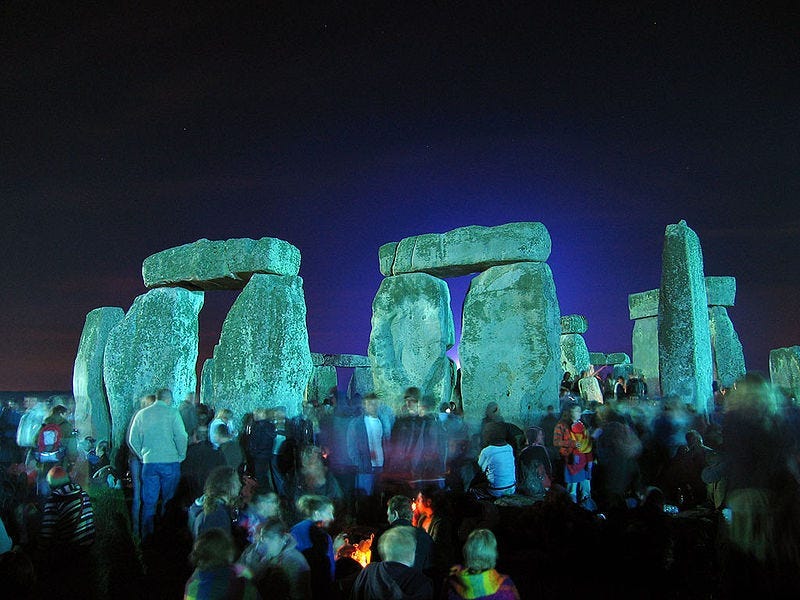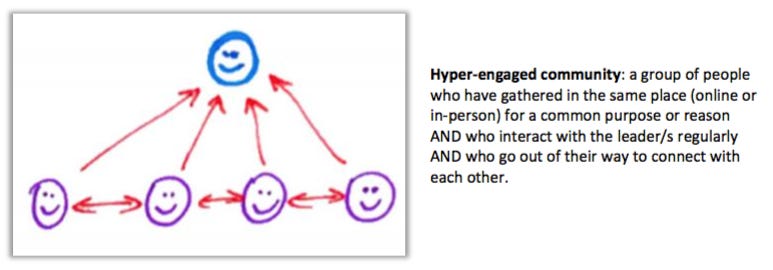
There’s something wonderfully magical about communities.
I’ve been harping on about this fact for a while now, bending various ears in the process (apologies if yours are recovering!), so I thought it’s about time I wrote a post about them.
Hmm where to start.
So a couple of odd decades ago, the UK — and the world at large — was a very different place. Technology, globalisation and other big trends have changed things, a lot.
For example, one thing more typical to see in 1960 was this: more went to church service on a Sunday. Whether you’re into religion or not (that’s not my point here), this was a good thing. People came together in their communities every week, in unity, for a single purpose. There was social support, a feeling of belonging, sense of self worth and a temporary loss of sense of self… this did wonders for everyone’s wellbeing.
On describing his transformative experience where he went to a massive rave for his 26th birthday, Zappos CEO Tony Hsieh (in Delivering Happiness) describes how:
“The entire room felt like one massive, united tribe of thousands of people, and the DJ was the tribal leader of the group…Everyone in the warehouse had a shared purpose. We were all contributors to the collective rave experience.” (p.92–93).
He goes on to say:
“I didn’t know it at the time, but ten years later I would learn that research from the field of the science of happiness would confirmed that the combination of physical synchrony with other humans and being part of something bigger than oneself (and thus losing momentarily a sense of self) leads to a greater sense of happiness, and that the rave scene was simply the modern-day version of similar experiences that humans have been having for tens of thousands of years.”
Going back to 1960, I’ve heard stories of neighbours leaving their back doors open and wondering in and out as they pleased(!). Apparently, this was quite commonplace. A huge sense of trust (again, a reason why wellbeing in the western world has flatlined/fallen since then), and also the signs of a close-knit community.
Over the last 12 months in particular, I have grown in many ways, and much of this has been down to the communities I have been fortunate to have been part of.
Whether it’s going through a career change (Escape The City) or talking about mental health and happiness (Action For Happiness; my Masters cohort), setting up a purpose-led business (Happy Startup School), or anything else for that matter — the “thing” which has brought you together doesn’t seem to matter so much as having an excuse to bring folks together, for real, authentic, high-quality, warm, open, social interaction.
And it would seem that this is a void that has, for many of us, whether we know it or it not, been missing.
Why? That’s a difficult one to answer, though I can hazard a guess at a couple of the determining factors:
– The pursuit of profit
In the status/fame/money-driven world we live in, the pursuit of profits (above all else, and at the expense of other things) seems to have gone into mega-drive. As a result we’ve naturally become more self-centred and individualistic, competing with one another at all costs.
– Cities are getting more populated
It sometimes feels that there are too many people to really harbour a sense of community. After all, we can only have meaningful relationships with a set number of people (this magic number always seems to be changing, though the general agreement is that such a number does exist).
This also explains the “more dense population = more competition = greater individualism = lesser community / trust” equation, and vice versa (less dense population = less competition = less individualism = greater community/trust). Of course, the equation isn’t quite as simplistic as that, but this is a general trend seen in the West.
– Technology and social media
We text/Whatsapp/Facebook message one another all day long. We even have groups of family and friends that we dip into and out of. So we fool ourselves into thinking that we’re more connected. The reality is that we spend less time talking on the telephone, actually spending time in front of one another, in-person. And when we eventually do get around to doing the latter, we’re so glued to our screens — presumably because of everything we’re “missing out on” (hello FOMO) even during that treasured one-hour of quality time we’re spending with that friend or family member.
Economist and happiness expert Richard Layard (Happiness: Lessons from a New Science) describes how “family relationships” and “community and friends” are two of the Big 5 factors affecting our wellbeing. We need real-life, high-quality social relationships more so than we think. It is actually more detrimental to have lots and lots of acquaintances, with fleeting low-quality interactions, than it is just to have a couple of high-quality interactions. We need to stop trying to have everything at once as it’s clearly not the best way to go.
//
Crossfit is the latest fitness craze that has gone global. There’s a gym near me where members pay £165 a month. £165! Why?
I recently was speaking to someone who goes to one and he spoke about the group-workouts, how everyone is in it together, how there’s a big social element to it.
I see AirBnB connecting people with one another for stays, BlaBlaCar doing the same for trips… we’re seeing the sharing economy connect people, build trust, and foster high-quality interactions.
Businesses everywhere — even the huge, gigantic ones — are trying to foster relationships with their customers, but also between them. After all, the best networks are the ones where there is cross-interaction and -collaboration within them, like this:

Here are some of the communities I’m aware of, several of which I’ve been a part of:
Escape The City
Happy Startup School
Action For Happiness
Live Your Legend
Sunday Assembly
Chaps Choir
Good Men Project
World Domination Summit
Rock Your Purpose Live (RYPL)
There are many more out there — in the form of clubs, groups, societies, gatherings; a community can take all sorts of forms, shapes and sizes.
It isn’t the “collective purpose” of the community that matters as such. It’s the people that make the community what it is. The purpose is just the reason for the getting-together.
There is magic in communities — may they continue to thrive 🌱
from,
Jasraj


